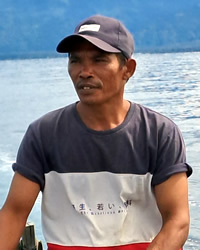Tomini in Indonesia

Photo Source:
Anonymous
|
Send Joshua Project a map of this people group.
|
| People Name: | Tomini |
| Country: | Indonesia |
| 10/40 Window: | Yes |
| Population: | 32,000 |
| World Population: | 32,000 |
| Primary Language: | Tomini |
| Primary Religion: | Islam |
| Christian Adherents: | 0.00 % |
| Evangelicals: | 0.00 % |
| Scripture: | Portions |
| Ministry Resources: | No |
| Jesus Film: | Yes |
| Audio Recordings: | No |
| People Cluster: | Kaili-Tomini of Sulawesi |
| Affinity Bloc: | Malay Peoples |
| Progress Level: |
|
Introduction / History
The Tomini live in the districts of Tomini, Tinombo and Moutong in the Donggala regency of Central Sulawesi province. These three contiguous districts stretch from the northeast to the south and form a half circle facing the Tomini Bay. The coastal area is made up of plains, specifically in the northern part of Moutong district. The plains grow narrower to the south, while the coastal regions remain flat and the interior areas are mountainous. Many of the valleys in the interior have fertile, irrigated rice farms and the land is well cultivated. Other original inhabitants of this area are the Dampelas, the Balaesang and the Pikoro. The Tomini have their own language (Tomini) but several trade dialects have emerged because of their interactions with their neighbors. The Tomini language is part of a larger linguistic grouping called the Nothern Tomini subgroup which also includes the Lauje and Dondo.
What Are Their Lives Like?
The coastal areas are open plains, particularly in northern Moutong. The plains are narrower in the south. The inland is hilly and mountainous with lush well-tilled fields in the valleys. Tomini villages are made up of small wooden houses built on stilts. The Tomini living in the coastal areas are farmers of cloves and copra (dried coconut meat). Many of these Tomini also seek supplemental income from trading, forestry or fishing. In the mountains, the Tomini people cultivate rice and corn. They also gather rattan to be sold on the coast. The marriage system follows Islamic guidelines. An intermediary talks with the parents of the bride and makes arrangements according to the status of the girl. Marriage is allowed between first cousins and polygamy, although allowed, rarely occurs. After marriage, the couple usually stays with one of their families until their first child is born. In earlier times, Tomini was a sultanate. The sultan and his aides were chosen through the ancestral line. During those times, there were four classes of people: royalty, nobility, commoners and slaves. In the late 1950s, separatist movements seeking independence from the Indonesian government were led by young people throughout Sulawesi. In the Tomini region, this reached a peak with the Permesta Rebellion of the 1960s. This rebellion almost destroyed the local economy, as no marketable product was produced during this time. Since that time, the government has tried to integrate the area into the national and international economic systems. Cloves were successfully introduced in large plantations and national and international lumber firms have established themselves throughout the area. However, their production has dramatically decreased in recent years.
What Are Their Beliefs?
The Tomini people are followers of Sunni Islam, but they are not fanatical about their faith. Many still hold to their ancient religion of animism. They believe spirits indwell inanimate objects and many Tomini mix worship of their ancestors and nature with Islam.
What Are Their Needs?
Currently, the Tomini need improved infrastructure to market their produce (cloves, copra, onions and rattan). They need increased trade to overcome the lingering weakness in the economy which has never fully recovered from the economic destruction of the Permesta Rebellion.
Prayer Points
Pray for the Lord to send them dreams and visions that will open their hearts to the King of kings.
Pray for loving workers.
Pray for the Tomini people to experience and crave the Lord's unmatched glory.